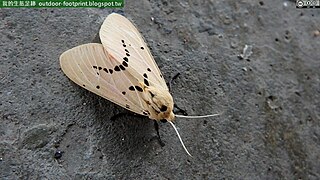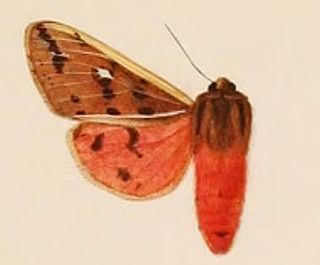
Spilarctia is a genus of moths in the family Erebidae. The genus was erected by Arthur Gardiner Butler in 1875.

The Nyctemerina are a subtribe of woolly bear moths in the family Erebidae.

Spilaethalida turbida is a moth of the family Erebidae first described by Arthur Gardiner Butler in 1882.
Semicalamidia is a monotypic moth genus in the family Erebidae erected by Rob de Vos in 2012. Its only species, Semicalamidia owgarra, was described by George Thomas Bethune-Baker in 1908. It is found in Papua New Guinea where its habitat consists of mountainous areas.
Neosyntaxis is a monotypic moth genus in the family Erebidae erected by Rob de Vos in 2012. Its only species, Neosyntaxis warringtonella, was first described by George Thomas Bethune-Baker in 1908. It is found in Papua New Guinea. The habitat consists of mountainous areas.
Monosyntaxis bipunctata is a moth of the family Erebidae. It was described by George Thomas Bethune-Baker in 1904. It is found in New Guinea, where it is found in mountainous areas, particularly the Central Mountains. It is also found in Papua New Guinea.
Papuasyntaxis is a monotypic moth genus in the family Erebidae erected by Rob de Vos in 2009. Its only species, Papuasyntaxis metallescens, was first described by Walter Rothschild in 1912. It is known only from central Papua Indonesia; however, it is probably also present in the central western part of Papua New Guinea.
Monosyntaxis bimaculata is a moth of the family Erebidae. It was described by Rob de Vos in 2009. It is found in New Guinea, where it has only been recorded from the Foja Mountains.
Nyctemera groenendaeli is a moth of the family Erebidae first described by Rob de Vos in 1994. It is found in New Guinea.
Nyctemera evergista is a moth of the family Erebidae first described by Stoll in 1781. It is found on the Moluccas, Seram, Buru and in New Guinea.
Nyctemera mastrigti is a moth of the family Erebidae first described by Rob de Vos in 1996. It is found in New Guinea and Papua New Guinea.
Spilarctia grandimacula is a moth in the family Erebidae. It was described by Rob de Vos and Daawia Suhartawan in 2011. It is found in Papua and Papua New Guinea. It has been recorded from the Central Mountains in western Papua, east into Papua New Guinea.
Spilarctia mastrigti is a moth in the family Erebidae. It was described by Rob de Vos and Daawia Suhartawan in 2011. It is found in Papua and Papua New Guinea.
Spilarctia transversa is a moth in the family Erebidae. It was described by Rob de Vos and Daawia Suhartawan in 2011. It is found in Papua New Guinea and Papua, where it seems to be restricted to the Central Mountain Range.
Spilarctia nana is a moth in the family Erebidae. It was described by Rob de Vos and Daawia Suhartawan in 2011. It is found in Papua and Papua New Guinea. The habitat consists of mountainous areas.
Spilarctia adriani is a moth in the family Erebidae. It was described by Rob de Vos and Daawia Suhartawan in 2011. It is found in Papua, Indonesia.
Spilarctia cinnamomea is a moth in the family Erebidae. It was described by Rob de Vos and Daawia Suhartawan in 2011. It is found in New Guinea.
Spilarctia vulgaris is a moth in the family Erebidae. It was described by Rob de Vos and Daawia Suhartawan in 2011. It is found in New Guinea.
Spilarctia wernerthomasi is a moth in the family Erebidae. It was described by Rob de Vos and Daawia Suhartawan in 2011. It is found in New Guinea.
Utetheisa ampatica is a moth in the family Erebidae. It was described by Rob de Vos in 2007. It is found in Papua New Guinea, where it has been recorded from the Raja Ampat Islands of Salawati and Waigeo.


